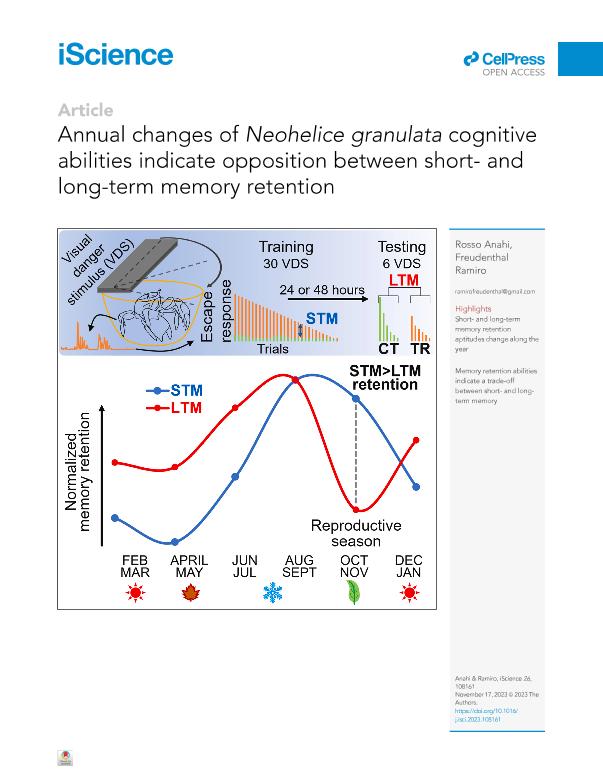Mostrar el registro sencillo del ítem
dc.contributor.author
Anahi, Rosso
dc.contributor.author
Freudenthal, Ramiro A. M.

dc.date.available
2024-01-08T13:25:10Z
dc.date.issued
2023-11
dc.identifier.citation
Anahi, Rosso; Freudenthal, Ramiro A. M.; Annual changes of Neohelice granulata cognitive abilities indicate opposition between short- and long-term memory retention; Cell Press; iScience; 26; 11; 11-2023; 1-14
dc.identifier.issn
2589-0042
dc.identifier.uri
http://hdl.handle.net/11336/222797
dc.description.abstract
Neohelice is a long-standing model for memory studies for its strong retention of a reduced escape response when trained to iterative presentations of a visual danger stimulus (VDS). Here we present year-round changes that are related to the memory acquisition, storage, and expression. First, we evaluated exploratory activity and response to the VDS, as necessary for memory acquisition and expression. Both parameters change year-round. Second, short-term memory (STM) and two types of long-term memory (LTM) were assessed throughout the year. STM and long-term context-dependent signal memory (CSM) change between periods of the year, whereas signal memory (SM) does not, indicating that the cognitive abilities of the crab display circannual rhythms. Third, during the reproductive period, STM retention is higher than both CSM and SM, indicating a trade-off between STM and LTM. This is the first report of memory retention abilities changing seasonally as a trade-off between short- and long-term memories.
dc.format
application/pdf
dc.language.iso
eng
dc.publisher
Cell Press

dc.rights
info:eu-repo/semantics/openAccess
dc.rights.uri
https://creativecommons.org/licenses/by-nc-nd/2.5/ar/
dc.subject
BIOLOGICAL SCIENCES
dc.subject
EVOLUTIONARY BIOLOGY
dc.subject
MEMORY RETENTION
dc.subject
ZOOLOGY
dc.subject.classification
Otras Ciencias Biológicas

dc.subject.classification
Ciencias Biológicas

dc.subject.classification
CIENCIAS NATURALES Y EXACTAS

dc.title
Annual changes of Neohelice granulata cognitive abilities indicate opposition between short- and long-term memory retention
dc.type
info:eu-repo/semantics/article
dc.type
info:ar-repo/semantics/artículo
dc.type
info:eu-repo/semantics/publishedVersion
dc.date.updated
2024-01-05T11:43:34Z
dc.journal.volume
26
dc.journal.number
11
dc.journal.pagination
1-14
dc.journal.pais
Estados Unidos

dc.journal.ciudad
Cambridge
dc.description.fil
Fil: Anahi, Rosso. Universidad de Buenos Aires. Facultad de Ciencias Exactas y Naturales. Instituto de Biociencias, Biotecnología y Biología Traslacional.; Argentina. Universidad de Buenos Aires. Facultad de Farmacia y Bioquímica. Departamento de Biología Celular e Histología; Argentina
dc.description.fil
Fil: Freudenthal, Ramiro A. M.. Universidad de Buenos Aires. Facultad de Ciencias Exactas y Naturales. Instituto de Biociencias, Biotecnología y Biología Traslacional.; Argentina. Consejo Nacional de Investigaciones Científicas y Técnicas. Oficina de Coordinación Administrativa Ciudad Universitaria; Argentina. Universidad de Buenos Aires. Facultad de Farmacia y Bioquímica. Departamento de Biología Celular e Histología; Argentina
dc.journal.title
iScience
dc.relation.alternativeid
info:eu-repo/semantics/altIdentifier/url/https://www.sciencedirect.com/science/article/pii/S2589004223022381
dc.relation.alternativeid
info:eu-repo/semantics/altIdentifier/doi/http://dx.doi.org/10.1016/j.isci.2023.108161
Archivos asociados
